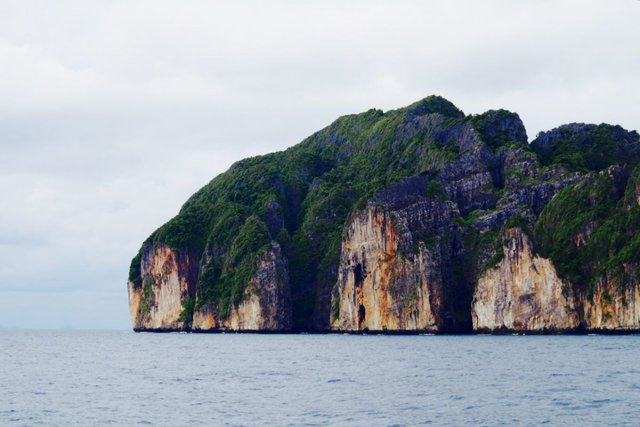The Phi Phi Islands National Marine Reserve is where I first held an underwater camera. These islands and reefs that are part of the marine reserve offer, in my opinion, the best diving in Thailand. Not only are the islands stunning below the surface but the limestone cliffs that soar vertically from the water are equally impressive. The cliffs are laced with makeshift bamboo ladders that are used to access the higher areas where the swallows nest. These nests are a prized food. They are collected and then thru a centuries-old process, turned into possibly the single most disgusting thing I have ever tasted in Thailand - Bird's Nest Soup. The gelatinous concoction is considered to be a delicacy throughout Asia and I believe is worth gram for gram more than gold.
Below the surface of the Phi Phi Islands the reefs teem with fish. The reefs drop to a maximum of about 30m but most of the best diving is from 5 - 10m. Its here in these shallow areas that we find huge Gorgonian Sea Fans, fields of brightly coloured Dendro soft corals, schools of tropical fishes and very often Hawksbill Sea Turtles and Black Tip Reef Sharks.
In the deeper areas where the reefs give way to sand it's very common to see resting Leopard Sharks. Look closely in the sand and you will spot camouflaged sting rays, sole or flounders and many different kinds of starfish, sea urchins and shell dwellers like hermit crabs or Cowries.
The video below is a little mix that I made for an old and dear friend - she is featured at about the 20 second mark showing off her remarkable buoyancy skills on a safety stop.
Sadly the reefs of Phi Phi are no longer all this amazing. The clips in this video are all more than 10 years old. Today much of the shallow corals have died from rising sea temperatures, many of the species have been over fished and often visibility is poor because of trawlers nearby using bottom trawling nets and stirring up the sand which then drifts in the currents and affects visibility for miles around.
One positive impact of Covid in this area has been a chance for our reefs to rejuvenate, less tourists equals less pressure on the fragile marine environment and also less demand for seafood in all the restaurants.
